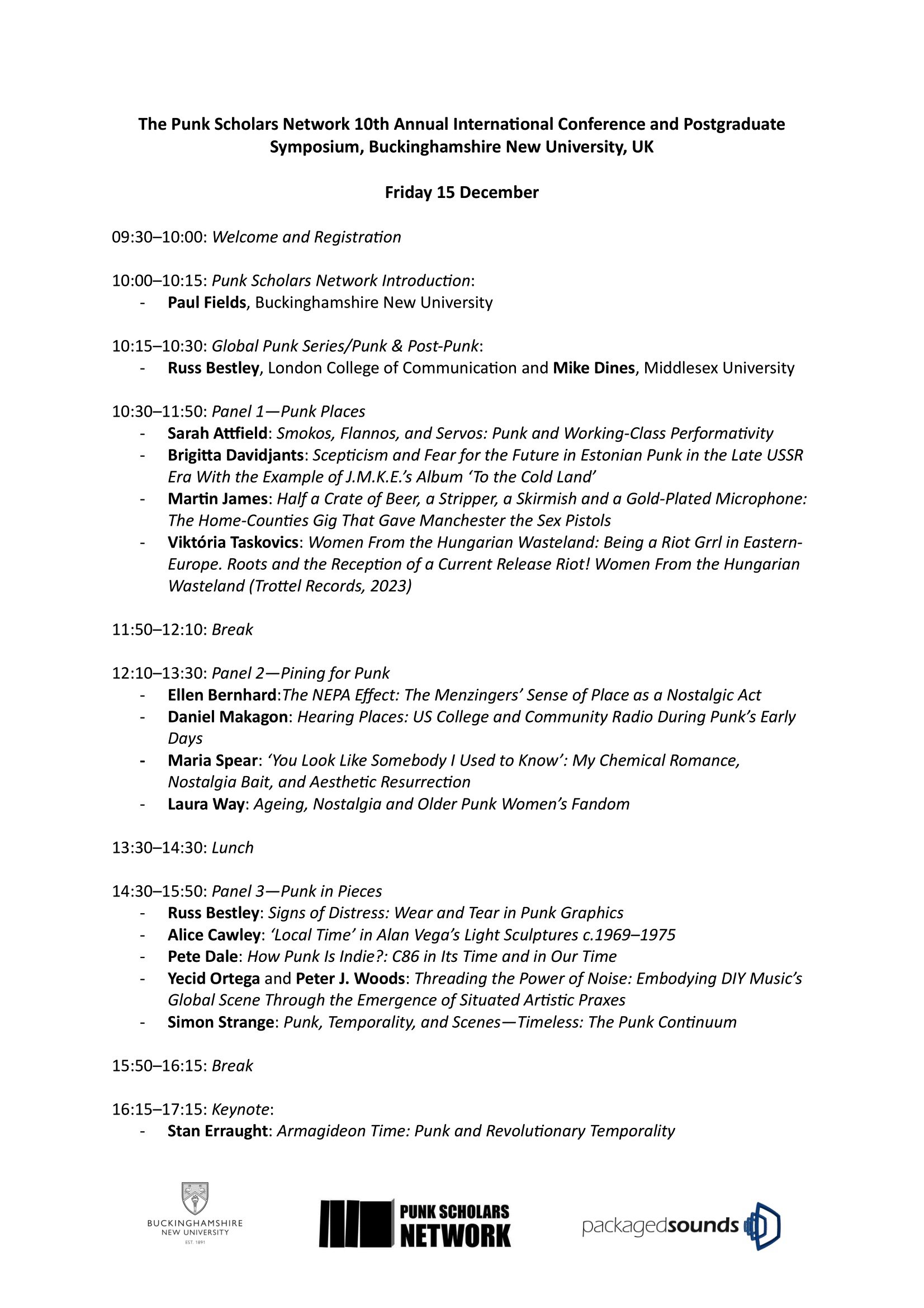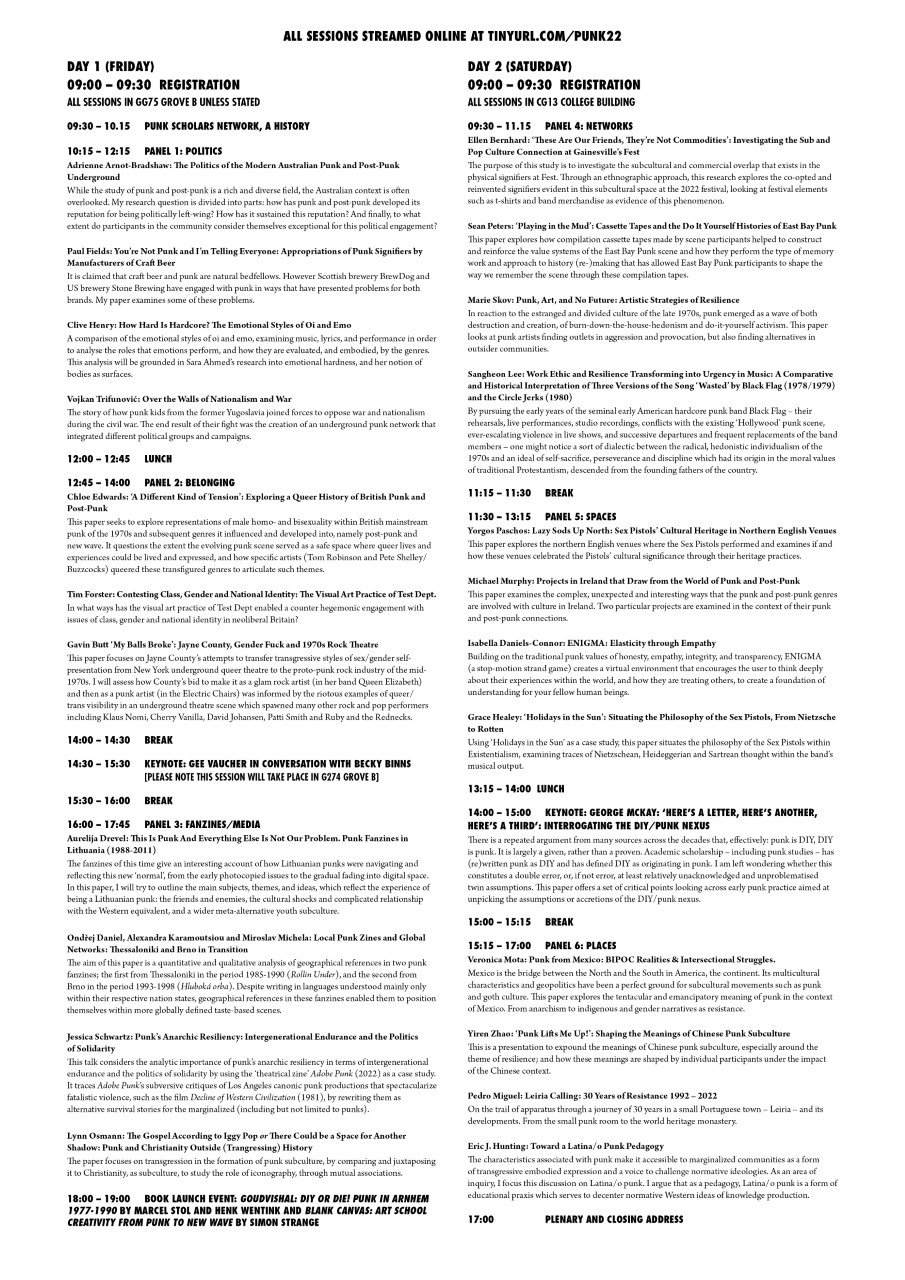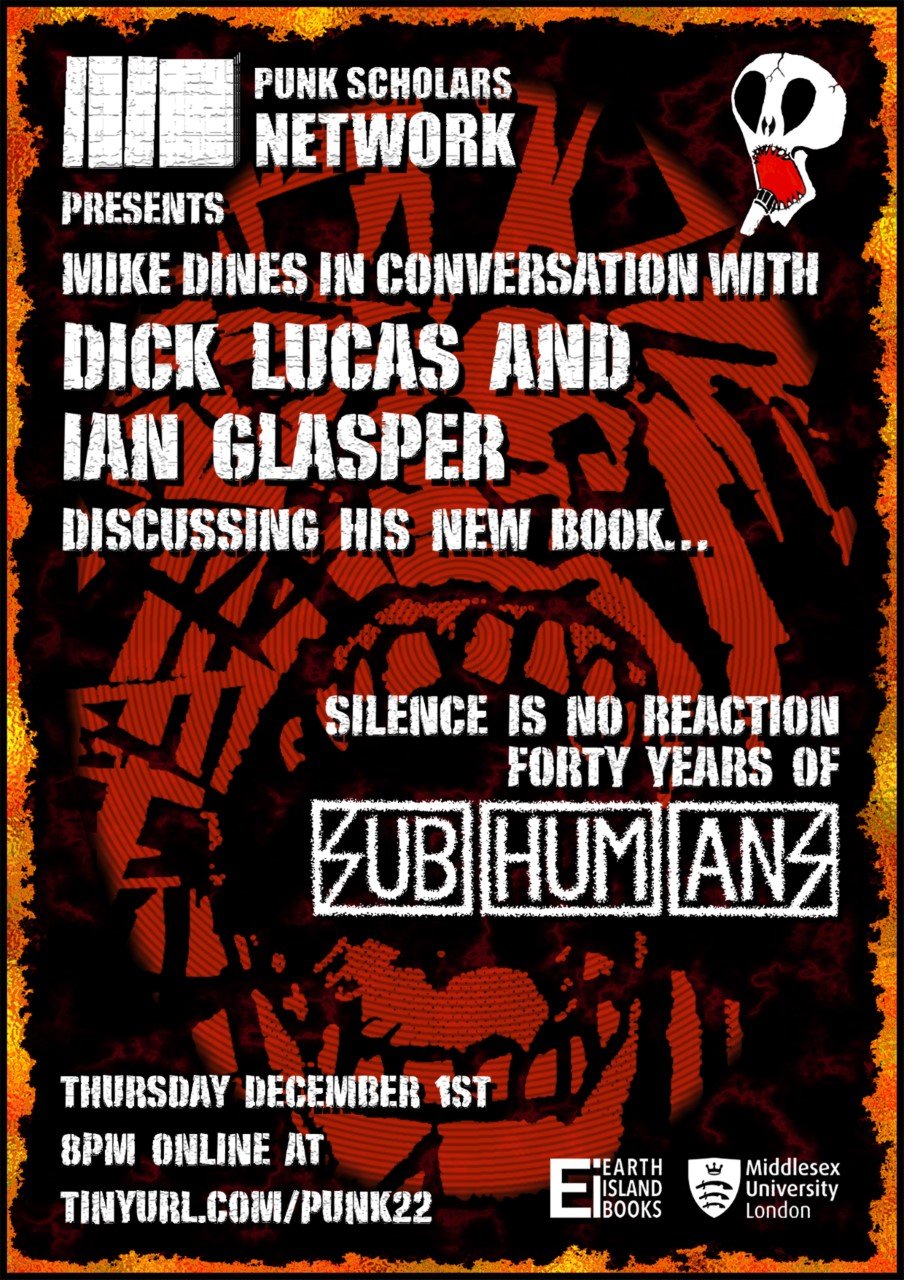Schedule for the Punk Scholars Network 11th Annual Conference at Stirling University
PSN 2024 UK Conference Programme
Room: Cottrell 2B84
12th December 2024
9:30am – Welcome, housekeeping etc: Francis Stewart
9:45 – 10:45 – Keynote 1 – Chair: Francis Stewart
Ruth Pearce, Be Trans Be Crime: Punk Pedagogy and How We Can Change the World
10:45 – 12:15 – Panel 1 – Aesthetics Chair: Laura Way
10:45 – 11:15 – Angela Bartram and Laura D. Gelfand, Punk and the Animal: Ethos, Ethics and Aesthetics
11:15 – 11:45 – Russ Bestley, Cash From Chaos: Selling the New Wave
11:45 – 12:15 – Pete Dale, Indie: post-punk creative genre or the status of an atrocity exhibition?
12:15 – 1 – Lunch
1 – 2:15 – Panel 2 – Status Chair: Francis Stewart
1 – 1:10 – Set up
1:10 – 1:30 – Jessica Schwartz
1:30 – 1:50 – Ellen Bernhard
1:50 – 2:05 – respondent: Alana Vincent
2:05 – 2:15 – audience responses and discussion
2:15 – 2:30 – Tea / Coffee break
2:30 – 4 – Panel 3 – Creativity Chair: Alice Hoole
2:30 – 3 – Sean McArdle, punk as a systems-making device
3 – 3:30 – Laura Way, Punk women, identity and gendered aging through a creative workshop
3:30 – 4 – Eric J. Hunting, Anarchy in the Archives: Punk Preservation & Archival Research
4 – 4:15 – Punk Podcast presentation – Jessica Schwartz and Paul Hollins
4:15 – 5:45 – Panel 4 – Space(s) Chair: Ellen Bernhard
4:15 – 4:45 – S. Mark Gubb, Beyond the Punkhouse, The Chapel of Unrest
4:45 – 5:15 – Alice Hoole, “If we’re having a football tournament, there’s gotta be at least some shit punk playing”: The influence and intersections of punk within radical DIY football clubs
5:15 – 5:45 – Evan Martin-Casler, Space-making as a practice of rebellion, refusal, and reterritorialization 2
PSN 2024 UK Conference Programme
Room: Cottrell 2B84
13th December
9:45 – housekeeping etc
10 – 11 – Keynote 2 - Chair: Sean McArdle
W. David Marx, How Status-seeking Creates Culture — and What that Means for Cultural Invention in the 21st Century
11 – 12:30 – Panel 5 - Transfer Chair: Pete Dale
11 – 11:30 – Sangheon Lee, The Birth of the Soviet/Post-Soviet Cold Wave Style?: A Comparative Analysis of Kino and UK Post-Punk
11:30 – 12 – Ondřej Daniel, From the Margins to the Mainstream: The Rise of Punk and Alternative Culture in Post-Socialist Czechoslovakia (1989-1990s)
12 – 12:30 – Ginette Chittick, Talking Back: Singaporean Punk in the 1990s
12:30 – 1:15 – Lunch
1:15 – 2:45 – Panel 6 – Artefacts Chair: Russ Bestley
1:15 – 1:45 – Viktória Taskovics, From the cover to the stage: Representation of Women in Hungarian Punk Art
1:45 – 2:15 – Mark Player, Punk (and) Cinema: Vectors for understanding punk’s relationship to film
2:15 – 2:45 - Sean Louis Peters, I’m Walkin’ Here!: Experiencing New York City’s Punk Scene through Bootleg Cassette Tapes
2:45 – 3 – tea / coffee break
3 – 4:30 – Panel 7 – Genre Chair: Jessica Schwartz
3 – 3:30 – Peter Woods, Borderwork as Emancipatory Praxis for Gender Nonconforming DIY Musicians
3:30 – 4 – Stan Erraught, Looking After Number One? Punk, Post Punk, and Neo-Liberalism in Ireland.
4 – 4:30 – Francis Stewart, Cripping bodily legitimacy in N Irish punk: A legacy genre?
4:30 – End of Conference
Registration for the 2024 Punk Scholars Network UK Annual Conference is Now Open
Registration for the 2024 Punk Scholars Network UK annual conference is now open. There are two options for tickets: in person and online, please select the one that best suits you. Those attending online will be send a TEAMS link 48 hours prior to the conference opening on the 12th December (UK timezones).
The panels will be a mixture of in person and online presentations throughout the two days.
Registration link: https://www.ticketsource.co.uk/booking/select/wAehEOCRbGmV
Celebrating the in Betweenness of Punk Art History: A Conversation with Maria Buszek by Daniel Makagon
Part of the Seeing the Scene Series
I enjoy doing this series because each interview teaches me something new about punk’s diverse visual culture. I am most familiar with photography—photographs themselves but also the ways that photographs work together to tell stories. However, I appreciate opportunities to have conversations with other punks about punk art that can stretch my thinking about current and historical punk culture. Maria Buszek is an art historian. She is broadly interested in feminist popular culture with specific interests in punk and post-punk art histories. I have read her work in the past and was excited to meet her this past summer at the 2024 Punk Scholars Network conference in Chicago. We agreed to talk for the Seeing the Scene series about the unique and overlapping histories of punk art (especially in the U.S. and the U.K.). I wanted to know how Maria understood various art modalities used by punks and her thoughts about the proliferation of art shows and museums dedicated to punk art.
To continue reading, click here.
PSN USA and Canada 3rd Annual Conference: Punk On Display
How Laibach Killed Punk in the Former Yugoslavia by Marko Vojnić
Laibach's concerts come seriously close to the number of my most visited concerts, such as Gori Ussi Winnetou and Kud Idijoti. However, Laibach is a special case. Their concerts are not just an ordinary ‘best of’ section, but a conceptual journey through carefully selected songs, supported by VJ-ing full of strong messages in the manner of their recognizable style. Their concerts are more of a ritual than a performance and, as some would say, on the border between artistic performance and political manifesto. Yesterday's concert (05/10/24) at the Boogaloo club in Zagreb was another opportunity for Laibach to present their cult album Opus Dei in a new guise. If you're already asking about the location, I have to admit, I can't compare to the recent performance at the Small Roman Theatre in Pula. Pula has that ancient magic, the ancient amphitheater and that special feeling of history under a clear sky. No, yesterday's gig, regardless of the cramped space at Boogaloo, brought new energy and, dare I say, a more intense atmosphere. Upon entering Boogaloo, I immediately noticed something that disturbed me, several neo-Nazis who entered the concert. Seeing such characters at the concert of a band that, with irony, satirical commentary on totalitarian systems and propaganda visuals, constantly provoked and opposed fascism, was paradoxical. However, my uneasiness was eased by the message Laibach sent via the video wall ‘Death to Fascism.’ I hope those guys get the point.
Although it was clear that many came to the ‘event’ more than to the concert, had its moments of frustration. Yes, there was talk, but let's be realistic, this is a rock machine, not a theatre show. Laibach gives all on stage, while the audience, as usual, balances between engrossment in the message and the occasional need to be entertained. When we talk about Laibach and their cult album Opus Dei, we come to an interesting aspect of their artistic appropriation. Laibach are masters of ‘appropriating’ other people's work and transforming it into something new, often ironic. At this concert, they showed again why they are considered pioneers of this approach. Their interpretation of the song ‘Life is Life’ is an example of this art of appropriation in its best form. They turned the song from a banal anthem of joy into a serious, almost militaristic, reflection on power and authority.
Some would say it's vampirizing someone else's work, taking someone else's song and completely changing it. No, unlike regular covers, Laibach's process involves layered recontextualization. It is not only a musical reinterpretation, but also a philosophical and political deconstruction of the original meaning of the song. The concert ended with one of their latest covers, the song ‘I Want to Know What Love Is’ by the band Foreigner. Now, if you're wondering why Laibach would choose a song that celebrates love in such a clichéd form, the answer is simple: their version of the song is not the sentimental ballad that Foreigner originally intended it to be. Instead, Laibach conveyed the message of love as something that transcends individual feelings. Love becomes a symbol of a bigger idea, love of ideology, love of people, or maybe love of control? Irony is key.
The lyrics of the song talk about the desire to understand love, but Laibach's performance does not make us wonder what kind of love they are actually talking about. Is it the intimate love that we all desire or is it the love of an authority that unites and directs us? I must also mention an old anecdote about Laibach that has been circulating since their beginnings in the former Yugoslavia. When they appeared, in the early '80s, their music, much more industrial than today, caused widespread outrage. It was even said that ‘Laibach killed punk.’ Although punk was a revolutionary movement, Laibach managed to redefine the term subversion through even more radical soundscapes and ideological commentary, while punk remained, in a way, trapped in its anti-establishment forms. If anything, Laibach took a bag full of punk rebellion and expanded it into philosophical and artistic terrain that few had the courage to touch.
Regardless of the conversations in the audience, the fact that it was not Pula and that the atmosphere was different, yesterday's concert in Boogaloo was a true example of what Laibach represents - a strong, provocative musical and visual statement about power, authority and irony. Their ability to transform and appropriate other people's songs is not just imitation, but a thought-provoking creative act.
Laibach are masters of reinterpretation, and as long as they continue to play on the border between art and politics, their oeuvre remains fascinating for anyone willing to read between the lines and listen between the notes.
Marko Vojnić
Lecturer, Department of Textile and Clothing Design
Faculty of Textile Technology
University of Zagreb
Prilaz baruna Filipovića 28a
10000 Zagreb, Hrvatska
https://www.ttf.unizg.hr/en/teachers-and-associates/marko-vojnic/166
PSN USA & Canada 2nd Annual Conference Schedule
Slovenia’s Punk Revolution: A Conversation with Marina Gržinić by Daniel Makagon
The first wave of published histories of punk focused on the well-known bands and the larger cities, but since that time there has been an explosion of new information about smaller scenes and the bands that helped make those scenes. Of course, many zines in the past balanced a focus on the local with links to national and international punk, often via scene reports. However, the proliferation of personal websites, blogs, and social media outlets created opportunities for individuals to share their personal connections to historical punk and for people around the globe to learn about collective histories. We can read stories, see photos, and watch videos that document unique and common qualities of different scenes.
Marina Gržinić is a philosopher, theorist, and artist who splits here time between the Institute of Philosophy at the Research Centre of the Slovenian Academy of Sciences and Arts in Ljubljana, Slovenia and the Academy of Fine Arts in Vienna. She moved to Ljubljana at a time when punk was being discovered and inspiring some people in the former Yugoslavia to make their own scenes. She describes a unique scene in Ljubljana that was grounded in the politics of the time, where punks sought to both enact socialist ideals and resist some of the communist bloc norms. Photography and other visual arts were crucial features of the growing punk scene in Ljubljana and she actively participated in that scene through her work at the ŠKUC Gallery. Most recently, Marina has been involved with the curation of exhibitions that present the politics of Slovenian punk in the 1970s and 1980s as well as punk’s links to a variety of parallel socio-cultural shifts in Slovenia.
To continue reading, click here
Punk Scholars Network USA and Canada 2nd Annual Conference Call for Papers
The Punk Scholars Network 10th Annual International Conference and Postgraduate Symposium, Buckinghamshire New University, UK
Punk & Post-Punk 12.2
Call for Papers: Punk and Temporality UK conference
PSN US/Canada Conference Schedule
PSN US/Canada Conference Schedule: August 8 & 9, 2023
Tuesday’s Keynote speaker: Rebecca Valeriano-Flores (Negative Scanner)
Wednesday’s Keynote speaker: Liz Mason (Quimby’s Bookstore/Caboose Fanzine)
Call for Chapters: Bad Religion: Punk Politics, Philosophy, and Pedagogy
Call for Chapters
Bad Religion: Punk Politics, Philosophy, and Pedagogy
Editors
Ellen Bernhard, Assistant Professor of Digital Communication, Georgian Court University, US
Paul Fields, Senior Lecturer in Music, Buckinghamshire New University, UK
Contact
Deadline for Submissions
31 July 2023
With over 40 years of experience, 17 studio albums, and an extensive (and continuing) touring schedule, Bad Religion’s impact on music and culture is one worth investigating. The purpose of this edited volume will be to explore the impact of Bad Religion as a steadfast entity in a music genre notorious for its ephemeral tendencies. Because of this, we are interested in pursuing multidisciplinary perspectives on the subject of Bad Religion, seeking academic contributions that will examine different elements of the band’s decades-long tenure in order to demonstrate how Bad Religion’s role in punk rock’s history remains relevant today.
The purpose of this book is to contextualize the influence of the band Bad Religion and their impact on culture during their 40-year tenure. The editors seek submissions from across academic disciplines for an edited volume that will provide readers with a comprehensive understanding of Bad Religion’s significance and impact in punk rock.
Possible chapter topics include (but are not limited to):
The impact of Epitaph Records and/or Bad Religion on the mainstream music industry
The global impact of Bad Religion as a punk band
Career longevity as a punk band
Bad Religion’s efforts on Atlantic Records/in the mainstream
Semiotic/rhetorical/thematic interpretations of Bad Religion’s songs, music videos, posters, merchandise, crossbuster logo, album art, etc.
The politics of Bad Religion
The history of Bad Religion
Live (and virtual) performances
Texts: Bad Religion documentaries, books, interviews, social media presence, etc.
Bad Religion merchandise
The political, social, cultural, and philosophical impact of Bad Religion
Bad Religion fandoms - virtual and real
PhDs and punk
Abstracts of 300-500 words plus author biographies and institutional affiliations of 150-200 words are requested by 31 July 2023. The deadline for the finished chapter (approx. 7,000 words incl. references) is 31 January 2024.
Punk & Post-Punk 12.1
Punk & Post-Punk 12.1 is now available online. Print copies to follow shortly.
Contents
• Russ Bestley – Editorial
• Kieran Cashell – Autonomy and agency: The event of punk
• George Grinnell – On punk friendship and the limits of community
• Elizabeth Newton – Criticism as punctuation in the Riot Grrrl backlash
• Nikola Vojnović – Subcultural event tourism: A case study of Monte Paradiso HC/Punk festival in Pula (Croatia)
• Rupert Loydell – Multi-channel diffusion: An interview with Robert Hampson
• Russ Bestley – ‘You Make Me Sick’: An interview with Puss Johnson and Steve Eagles of Satan’s Cats
Obituary
Marie Arleth Skov – Vivienne Westwood obituary
Temmuz Süreyya Gürbüz – A Non-Obituary for D. H. Peligro
Book Reviews
Maxwell Woods – Damaged: Musicality and Race in Early American Punk book review
Maria Elena Buszek – A Kiss Across the Ocean: Transatlantic Intimacies of British Post-Punk & US Latinidad book review
Rupert Loydell – Blank Canvas: Art School Creativity From Punk to New Wave book review
Greg Bull – Goudvishal: DIY Or Die! Punk In Arnhem 1977-1990 book review
Russ Bestley – SO36: 1978 Bis Heute book review
Russ Bestley – PZ77: A Town A Time A Tribe book review
Rupert Loydell – Rock Against Racism Live. 1977-1981 / Syd Shelton: Rock Against Racism 1976-1981 book review
Rupert Loydell – A Book of Days / Surrender: 40 Songs, One Story book review
Film Review
Ginette Chittick – Scene Unseen film review
Available via Intellect Books:
Call for Papers: Punk Symposium in Berlin
The symposium is organized by the German branch of the Punk Scholars Network. We will come together for one day in Berlin Mitte, we will present & discuss during the day, and we are planning a performance and a concert in the evening. More on that later. For now: We are looking for contributions from academics and non-academics, from old punks and new punks. Write to us with your ideas!
Punk & Post-Punk 11.3 Available Now
Punk & Post-Punk 11.3 is now available online. Print copies to follow shortly.
Contents
• Russ Bestley – Editorial
• Brigitta Davidjants – Women’s experience in Estonian punk scenes during the transition from Soviet to post-Soviet society
• Antonio Pineda Cachero & Jorge David Fernandez Gomez – ‘No way: Eskorbuto for PM!’ Punk music and anarchist ideology in Eskorbuto
• Adam J. Goldwyn – The rhetoric of recovery in Social Distortion’s White Light, White Heat, White Trash
• Paul Fields – Just a noisy hall, where there’s a nightly brawl, and all that punk: The problematic union of craft beer and punk
Obituaries
• Michael Murphy – Cathal Coughlan obituary
• Marcus Blakestone – Mark Astronaut obituary
Book Reviews
Rob Thomas: Major Labels: A History of Popular Music in Seven Genres by Kelefa Sanneh
Russ Bestley: No Machos or Pop Stars: When the Leeds Art Experiment went Punk by Gavin Butt
Russ Bestley: From Arthaus to Bauhaus, 1972-1979 by Andrew J. Brooksbank
Simon Warner: Why Patti Smith Matters by Caryn Rose
Rupert Loydell: Themes For Great Cities: A New History of Simple Minds by Graeme Thomson
Rupert Loydell: The Light Pours Out Of Me: The Authorised Biography of John McGeoch by Rory Sullivan-Burke
Rupert Loydell: Mark Hollis: A Perfect Silence by Ben Wardle
Rupert Loydell: Exit Stage Left: The Curious Afterlife of Pop Stars by Nick Duerden
Event Reviews
Niall McGuirk – Rebellion Festival review
Michael Mary Murphy – R-Fest review
Exhibition Reviews
Russ Bestley: Days of Punk exhibition review
Robert Dahlberg-Sears: PUNK: The Revolution of Everyday Life exhibition review
Available via Intellect Books:
https://www.intellectbooks.com/punk-post-punk
_____________________________________________________________________________
The 9th Annual Punk Scholars Conference and Postgraduate Symposium, UK.
Excited to host the Punk Scholars Network 9th Annual Conference and Postgraduate Symposium at Middlesex University. The conference proper runs over two days, Friday 2nd and Saturday 3rd of December.
Join all sessions on-line via Zoom: TINYURL.COM/PUNK22
Mike Dines hosting Dick Lucas and Ian Glasper
To introduce the Punk Scholars Network 9th Annual Conference and Postgraduate Symposium, Mike Dines is interviewing punk musician Dick Lucas and author Ian Glasper on Thursday 1st December at 8pm.
Join the session on-line via Zoom: TINYURL.COM/PUNK22
Rebecca Binns' Book Launch and Q&A with Gee Vaucher
As part of the Punk Scholars Network 9th Annual Conference and Postgraduate Symposium, we are lucky enough to have the celebrated artist Gee Vaucher in conversation with author and academic Rebecca Binns.
Join the session on-line via Zoom: TINYURL.COM/PUNK22






























